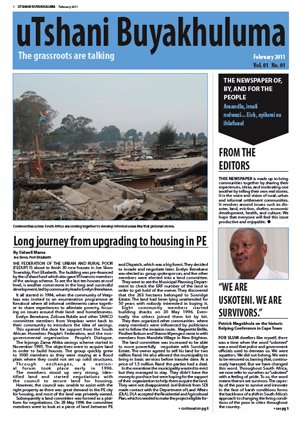Benjamin Bradlow '08 Helps Give Voice to South Africa's Poor Through New Publication
Benjamin Bradlow '08 Helps Give Voice to
South Africa's Poor Through New Publication
by Mariam Zakhary '13
3/14/2011

As the research and documentation officer for Slum Dwellers International (SDI) — an alliance of national community organizations of the urban poor in 33 countries in Africa, Asia, and Latin America— Benjamin Bradlow '08 generally finds himself reporting on the activities of SDI's member organizations. Recently, however, he worked with community partners in South Africa to publish a newspaper written entirely by members of SDI-affiliated groups and others living in informal settlement communities.
"For me, it is important to develop methods of documentation that amplify the voices of those leading this global movement for urban change," says Bradlow, who, with partner agencies, identified 12 writers and editors from all over South Africa to develop the project. "We met to discuss the kinds of stories that should go in the paper and then everyone submitted their stories. It has been incredibly inspiring to learn from these writers about the issues that are important to them in their communities, and to talk with them about how this can be articulated in the form of a newspaper."
The first issue of uTshani Buyakhuluma - Zulu for "the grass is talking," playing on the concept of grassroots organizing - was recently printed and has been very well received. Bradlow reports that it was distributed in informal settlement communities in every region of South Africa and that it is already changing conceptions.
"Communities are excited and are preparing to contribute stories for the next edition," he says. "Government officials and other formal actors have been taken aback at the breadth and depth of analysis and articulation that ordinary poor people have expressed in the first edition. Some private companies are also looking into advertising, so that this project can become free of donor funds."
At Swarthmore, Bradlow graduated with high honors in history and worked on the student newspaper, The Phoenix, throughout his four years, including as editor-in-chief. "The Phoenix provided me with technical and analytical skills that I have brought to bear on my subsequent work as a professional journalist and now in this project," he says. Bradlow also credits the history and English literature departments with preparing him to understand the role of communication and the written word in "determining and altering" relationships of power.
"To me, such concepts do not live in the realm of theory," he says. "In my work with federations of the urban poor through SDI, the practice of altering the dynamics of power is something that is very alive and real. The key is to support the initiatives of ordinary people that too often find themselves on the losing end of these relationships."
The first issue of uTshani Buyakhuluma [pdf] includes stories about community-led projects to upgrade informal settlements, forced-eviction at the hands of the State, opinion pieces about health and poverty alleviation policies, as well as poetry. Work is underway for the next issue, due to be published in April.


